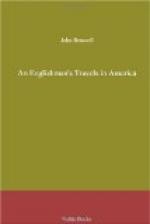Not very long after I arrived, a circumstance occurred that threatened most fearful consequences. The Indians whom I have before referred to were in the frequent habit, when they came to the city, to dispose of their produce (for many of them followed husbandry) of getting so tipsy, that there was continual danger of bloodshed; their natural animosity on such occasions being roused with fearful vehemence, so that the authorities were compelled to adopt some steps to remedy the evil. It was no uncommon occurrence to see an Indian waggon by the road-side, with its pair of horses sans driver, who might have been found either drunk or quarreling at the other end of the city. And although the horses were always impounded, and a fine inflicted, still the nuisance continued without abatement, in fact, was rather on the increase. The new Mayor, being a man more alive than his predecessor to this evil, caused a regulation to be passed by the Civic Council, that any Indian found so far the worse for liquor in the streets of Buffalo as to be incapable of taking care of himself, should be punished by being made to work on the high roads for a short period, with an iron ball and chain attached to his leg. When this law was promulgated, there was a strong impression that the Indians would show resistance. This was soon found to be a correct view of the case, for not a week had elapsed before two warriors were brought before the Mayor, and sentenced to ten days’ probation at road-mending, in pursuance of the decree. They had, however, only been at work two days in the upper part of Maine-street, in charge of two constables, when a large body of their fraternity, armed cap-a-pie, entered the city, and, with horrid yells and brandished tomahawks, rescued the culprits, knocked off their chains, and carried them in triumph to the Indian village, amidst fearful threats of fire and blood. As this attack was unexpected, no resistance was offered; and although there was much discussion afterwards, about the laws being vindicated and an example being made, the matter, from motives, no doubt, of public safety, was allowed to drop, and for the future the red men had it all their own way, although there were certainly signs of amendment, and the evil decreased to a very great extent. The Indian maxim being, “Firm in friendship but ruthless in war,” there is little doubt that the course pursued on this occasion by the city authorities, was the best under such circumstances.
Lake Erie is a fine piece of water, being 265 miles long, from Buffalo to Detroit, the two extreme ends, and averaging about 60 miles broad. At its north-east end it communicates with Lake Ontario and the Canadian shores, by the gut or strait of Niagara. Towards the west end are numerous islands and banks, which are furnished with light-houses for the guidance of the mariner. Its waters wash the foot of Maine-street (Buffalo) where they meet the river from which that city takes its name. It is frequently visited by furious gales, which play havoc with the steamers, many of which are annually wrecked.




